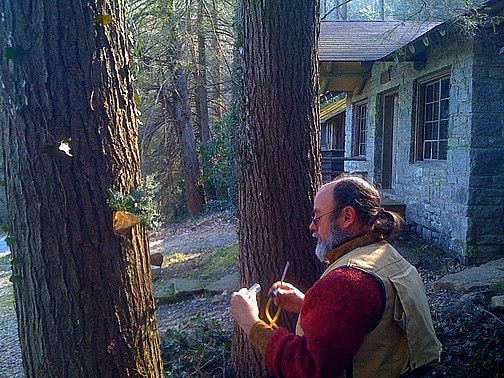There is a pest, a small insect native to Japan called the “hemlock woolly adelgid,” that is threatening the health of hemlock trees all across the eastern United States. From Maine to Georgia, along the Appalachian mountains and Piedmont, hemlock trees are dying, and unfortunately Rockbrook has not been immune. Perhaps 75% of the hemlock trees at camp (and we have a lot on our 200+ acres) have been infected. You can easily tell because the insect produces a white wool-like substance at the tips of the trees’ branches.
Initially, scientists attempted to control the woolly adelgid using chemical insecticides, but now there is a growing consensus that a particular Japanese lady beetle, Sasajiscymnus tsugae (“Sassie”), can provide effective biological control of the pest. These small, pinhead-sized black beetles eat exclusively adelgids and a few aphids. They evolved alongside the aldelgid in Japan, and are, as it turns out, a very effective and very specific predator. The U.S. Forest service conducted several years of testing and has now embarked on a large scale effort to release colonies of the Sassie beetle in infected areas. It is somewhat difficult, time-consuming and costly to raise colonies of the predator beetle, but their long-term effectiveness in controlling and even reversing the damage done by the woolly adelgid has been remarkable.
Working with Dr. Patrick Horan, Rockbrook Camp is treating its hemlocks with multiple colonies of the Sassie beetle. We’ve picked more than a dozen trouble spots (like the trees shown here near the Junior Lodge) as starting points, but as the beetles mature and reproduce, we hope they will spread and attack the woolly adelgid throughout the camp. It takes several months, even years to see the benefits of the beetles’ work eating the adelgids, but we’re excited and hopeful to see the results.
P.S. One of our release sites is up on Dunn’s Rock where there are some of largest known examples of Carolina Hemlocks.



0 Comments
Comment section